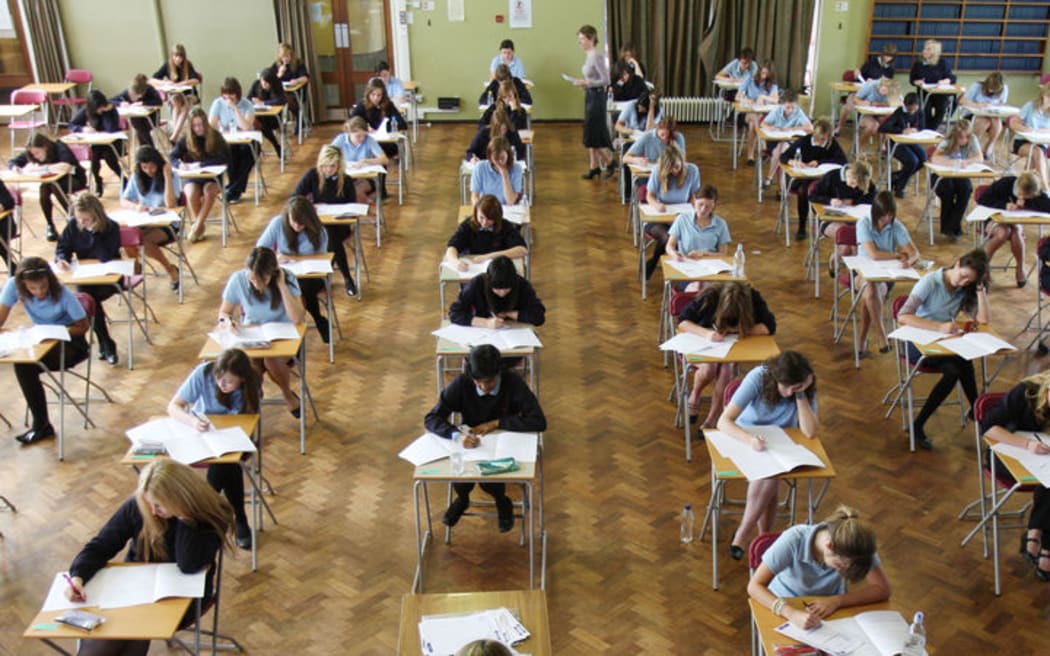With a few weeks before NCEA exams, education consultant Karen Boyes has key tips for students heading into study leave.
Karen is a teacher, author and public speaker who has twice won New Zealand Educator of the year. She's the CEO of Spectrum Education.

Photo: Supplied
Here are her top tips for students heading into study leave:
- Get your practice papers back, find out what you don’t know, the gaps in your knowledge, and study that.
- Make a diary study plan. First what are the things that need to happen? Music practise, sports games, cultural activities, church, add them in. Then, prioritise your learning. Which subjects do you find hardest? When would be best to tackle them?
- Make a physical space to study and prepare before each study session.
- Work in 20 minute chunks with a 5 minute break in between. At the end of every day, revise what you’ve learnt.
- Find out how you learn. Maybe you like to use a brainstorm, coloured pens in your notes, talking it through with friends, making up rhymes or raps, whatever helps the information stick.
- The way to test if it works is turn your notes over, can you still remember them? What about tomorrow? What about next week?
- Boil down your notes to ‘triggers’, key points or bits of information that will jog your memory.
- No last minute cramming!
- Brain food is key. Have something like a banana, a handful of nuts or a tuna sandwich every hour and don’t forget to exercise!
- In the exam if you can’t remember something take a break, take a few deep breaths and if you really can’t think, skip the question and come back to it.
Karen is a sought after speaker to educators and students both here and overseas.
She is the creator of the Teachers Matter Magazine, the Teachers Matter Conference, Kids Matter Conference, Study Smart Workshops and the Habits of Mind Bootcamp.
She was in RNZ’s Wellington studio, talking to Kathryn Ryan on Nine to noon,
Kathryn: It’s a stressful time for many students with exams still to go, what’s your starting point for how to approach this last run to the finish line?

Karen Boyes Photo: Supplied
Karen: maintaining motivation and focus at this time of year is important. Every student will have done mock exams or practise exams. The purpose of those mock exams is to find out what you don’t know, The most important study tip is to learn what you don’t know, this is the time, take those papers, find what you don’t know and learn that.
Most people go over what they do know because that makes us feel good. Everything is hard before it is easy, it’s hard to learn the things you don’t know but there are many ways to do that. Bitesize chunks, three or four things at a time….when you check you know it you have to do it without looking at your notes. It’s a memory test.
Kathryn: There are skills for that as well and that is having sufficient of a trigger in order to recall what you know, to be strategic, to have an overall plan and then a plan within each subject. Let’s get down to the nitty gritty, what are the things you do to have enough of a trigger to pull out what you need to pull out?
Karen: Pneumonics, raps rhymes and rhythms, repetitions, just those memory keys and those pegs, having a mind map that you’ve done with the key points and then off those other bits of information, so when you remember the key points it triggers the rest.
Kathryn: Are you a fan of straight away, in exams, jotting down your triggers?
Karen: Absolutely. I say to students, the first thing you should do is scan through the entire paper, see what’s coming, that primes the brain so now you can think about it without worrying what’s coming up. Before that, get a blank piece of paper and scribble down everything that you can remember whilst they’re at the front of your mind.
Kathryn: Are there different strategies for different exams?
Karen: The strategies for revision are memory strategies. Study your most important piece of information right at the start of the study time, and then at the end revise what you’ve learned because the brain also remembers things that are most recent. If you study for 20 minutes and then take a 5 minute break, it gives you more firsts and lasts!
Kathryn: You’ve got to hold that information over a period of time and then be able to pull various bits out, how do you prioritise?
Karen: The repetition schedule for the brain is important, go over information you want to remember 24 hours later, then a week later and then every month if you want to continue at about ninety per cent recall. For students it’s very important that they continually repeat and repeat and repeat.
Kathryn: So you can’t just do the last minute cram and then it’s sitting there ready to go? It has to be at a deeper level of memory?
Karen: Cramming works if you have done the work prior, it doesn’t work if you are doing it fresh because at a short term memory level the brain can only take between 7 and 9 pieces of information at any one time. So once you’ve got more than that your brain can’t hold it and it just starts falling out.
Kathryn: What about procrastination? How do we talk students through establishing the sort of habits that break down procrastination?
Karen: Start planning your diary, what are the big rocks? The big things that need to happen? The sport, the music practise, the culture, the church, then around that it’s about prioritising, where do I fit my study? It’s about working on the subjects you aren’t doing so well on, getting into that habit of getting everything organised before you study, having that place to sit down and study. Turning off the social media, you can check that in your 5 minute breaks.
Kathryn: Are there physical things, keeping up outside activity and nutrition?
Karen: Brain food is extremely important and drinking enough water. Have brain food at least once an hour when you’re studying, something like a banana, a handful of nuts, a tuna sandwich, something that’s going to sustain you. If you’re singing to music you’re listening to then you aren’t concentrating and the brain isn’t remembering but if it becomes white noise then it’s fine to listen to.
Kathryn: For the kids who don’t think they are going to do very well, how do you say to them actually what we want is your best? How do you talk to them when they genuinely doubt their ability to do this?
Karen: It’s about the bigger picture, in life we will have to do things we don’t want to do, in life you have to step up to the mark in your job sometimes when it’s really hard. The skills and the habits and the motivation and the discipline they are learning now will help them springboard later in life. I guess, just suck it up for those few weeks, it’s only 4-6 weeks and just focussing, after that it’s how are you going to celebrate?
Free websites which might help:

